Last Updated:
January 20, 2017
by
Karen Mouws
| Version: 2
| 5,757 views
| 0 followers
members are following updates on this item.
Signal is a messenger app that protects your privacy. It works very similar to other messenger apps, such as WhatsApp or Facebook messenger, allowing you to send personal messages to your friends and create group chats. What does app does differently, is that it protects your conversations and your personal information.
Lots of people use Signal, because they want their conversations and personal data to remain private. It has recently even been called out as the safest app on the market. Other apps collect information on you, such as your name and age, but also where you are and what other things you like on the web. Some even know what you are talking about to your friends, so they can use that info for more personal advertising. At the same time, Signal takes care that no other parties can take a look at what you are saying, not even Google or the government.
Signal protects your conversations and personal information in two ways. Personal data is cut off before it is sent to their servers (the big computers they use to make messaging over the internet possible). That way they don't even know who or where you really are. Conversations are encrypted, so they stay secret.
You can compare it to a spy movie, where secret agents use a coding system to make messages unreadable to the outside world. No one can now read that message, without using the secret decryption key. This is called Cryptography and that has been around since forever. In history, almost every civilisation has used cypher wheels to protect secrets.

Did you know that the first computers were invented by Alan Turing, in order to crack the code created by the Germans in World War II? They used a device called Enigma, generating secret messages and codes that were impossible to decipher. Alan Turing and his team spent months researching and creating a machine that eventually did the trick. The allied forces could finally read the secret codes and the first computer was born.

Just like in any other messaging app, you can send photos or videos, use emojis (such as ) to show how you feel. That helps bring your message across, as emojis clarify your emotions and intentions. You can easily reduce misunderstandings that occur when only using text.
But in Signal you can also you use GIFS. Those are short moving images, for example a scene from a movie or a fun cartoon clip. They really spice up your conversation and make talking to your friends even more fun.
Of course Signal also has the option to create group conversations. You have the option to talk to multiple friends at once, for example to make arrangements for the pizza night you planned together or to share photos from the ski trip you all went on.
You can install Signal on your smartphone, both on Android and iPhone. The app then also works on tablets and iPads. There is even a desktop program, that you can install to talk while on your computer on laptop. Just download the app from the Play or App Store.
There is no age restriction on Signal, but we do recommend you ask your parents for permission first.
Once you've installed Signal, it will ask you for your phone number. You can't register with an email address. You will receive a text message to verify it's really you. Once that has all been done, you can start talking to your friends. 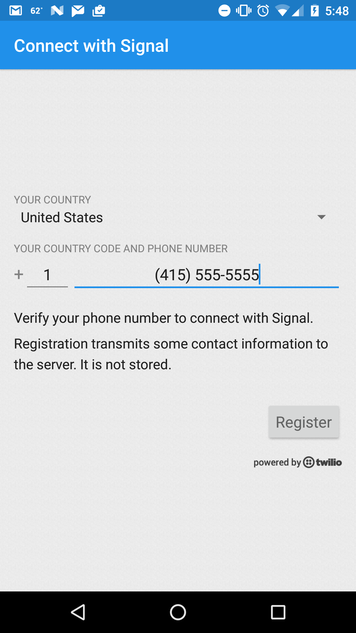
You might notice that you can also use Signal as your default SMS app, for when you want to send regular texts (without internet) to friends or family. This is not obligatory, so choose whatever you like.
Only people that have your phone number can talk to you: you have to be in each other's contact list. All your contacts that use Signal will be automatically imported. This protects you from complete strangers contacting you.
You can invite friends by clicking on the three dots in the top right corner and choosing the 'invite friends' option. That will generate a weblink you can send to your friends and they can install Signal to become your contact. You can share this link through other apps or plain SMS.
You can start a conversation with your friends by clicking the pencil icon in the bottom right. Choose the person you want to talk to. 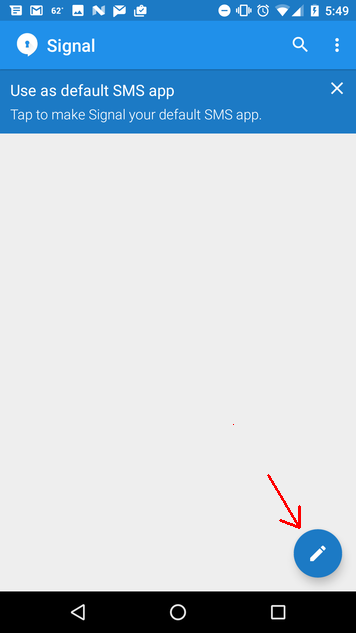
There are plenty of options to keep the conversation going and lively. Type in your message, but you can also add emojis or your pictures and videos. If you like, you can record and send a walkie talkie style spoken message or even call your contact over the internet.
If you don't want your message to stay forever, that is possible, just like photographs on Snapchat. That way, you can say something personal to a friend and it will disappear before anyone else can look over their shoulder. You can tell him or her all about your crush without having to worry about the secret getting out. 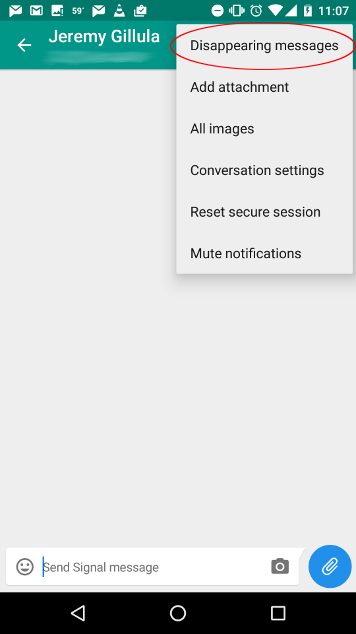
Starting a new group conversation is very easy. All you have to do is press the three dots at the top and click on New Group. Give the group a name and add all the members you would like to join the conversation.
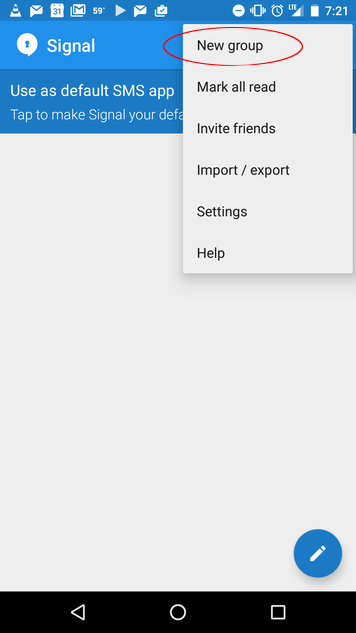
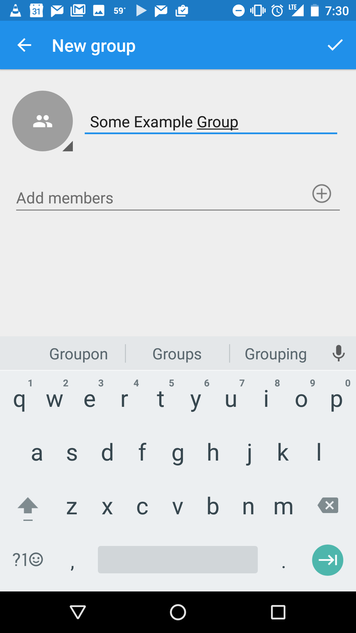
Just because an app says they're protecting you, doesn't mean it's always true. You are still responsible to protect your own privacy and stay safe online. Here are some tips:
If someone -in a personal conversation or in a group- is being mean or asking you for personal information, you should ignore them. Talk to an adult, such as your parents or a teacher, about what happened. If someone keeps on harassing you, you can block them.
Click on the person's name and then choose Block to make sure that person can't contact you anymore.

The Signal app is a great conversation starter to discuss privacy with your pupils. A lot of them will use messaging apps in their lives, with a varying degree of safety and privacy protection. Discuss why they use them and what happens to their personal data. For example WhatsApp has been bought by Facebook and now uses private info to generate more personal advertising.
An often heard argument on Privacy is that 'we don't have anything to hide, so we don't need to protect ourselves'. However, everyone has a need for privacy. Just because you don't haven't done anything wrong, doesn't mean you have nothing to hide. Privacy is not a right for criminals or wrongdoers. We all wear clothes to hide our bodies and we don't tell our neighbours how much money is in the bank. When we want to have a private conversation, away from prying ears, we move to another room. On the internet, our personal info is constantly being collected, both by commercial companies as for governmental purposes. How can we protect ourselves from this and to what extent should we?
There is not one right answer in this discussion and everyone will have a different view on their privacy. But it is very important to raise awareness about the topic, even in young children.
Images by https://support.whispersystems.org/ and https://ssd.eff.org/en/module/how-use-signal-android
Page Options